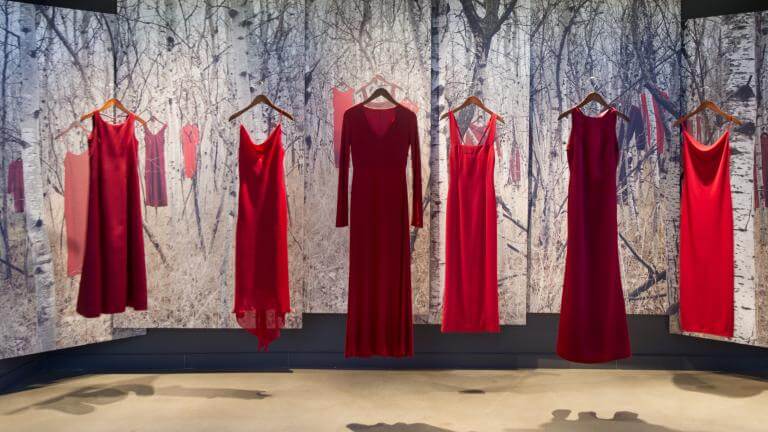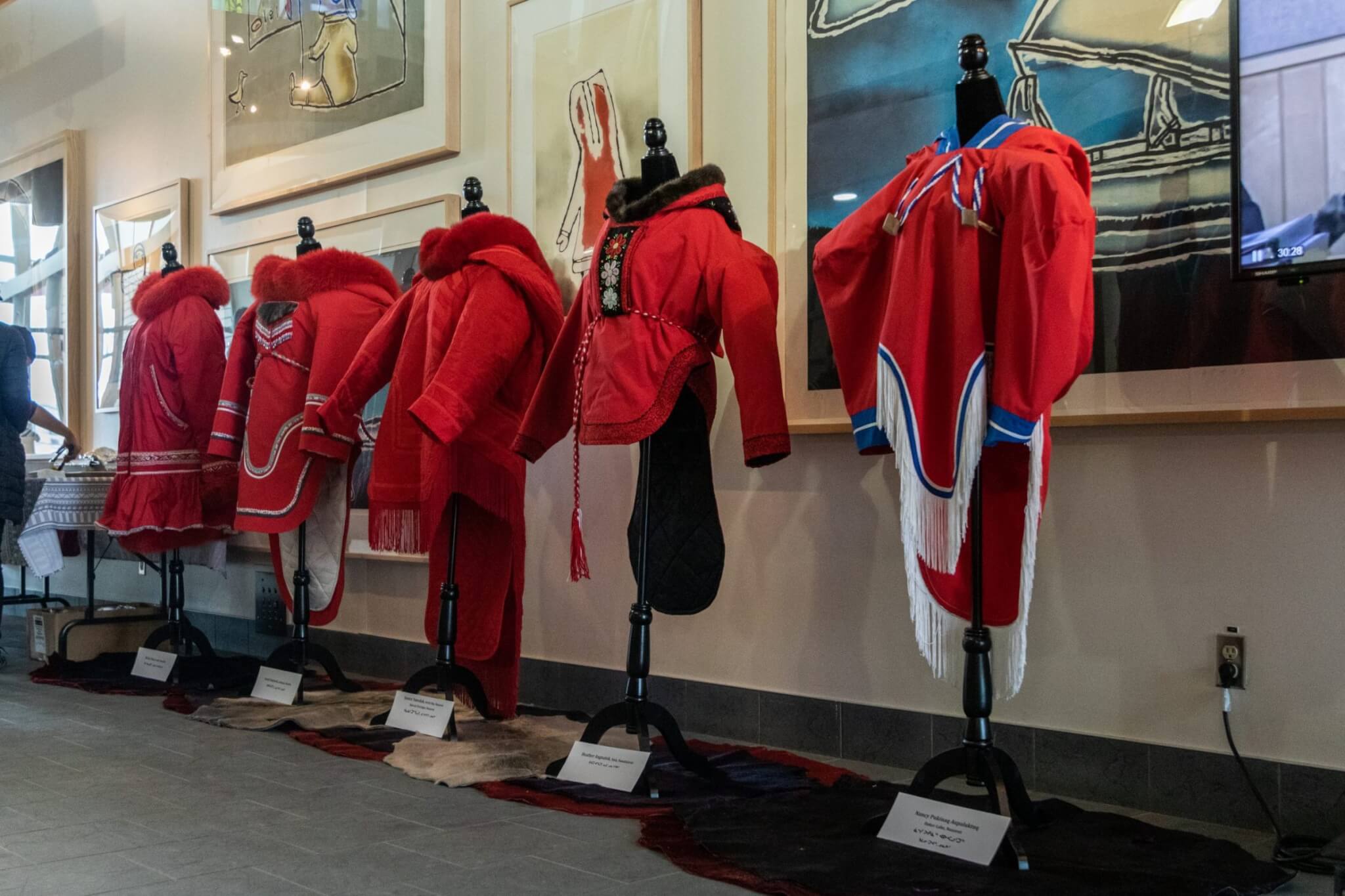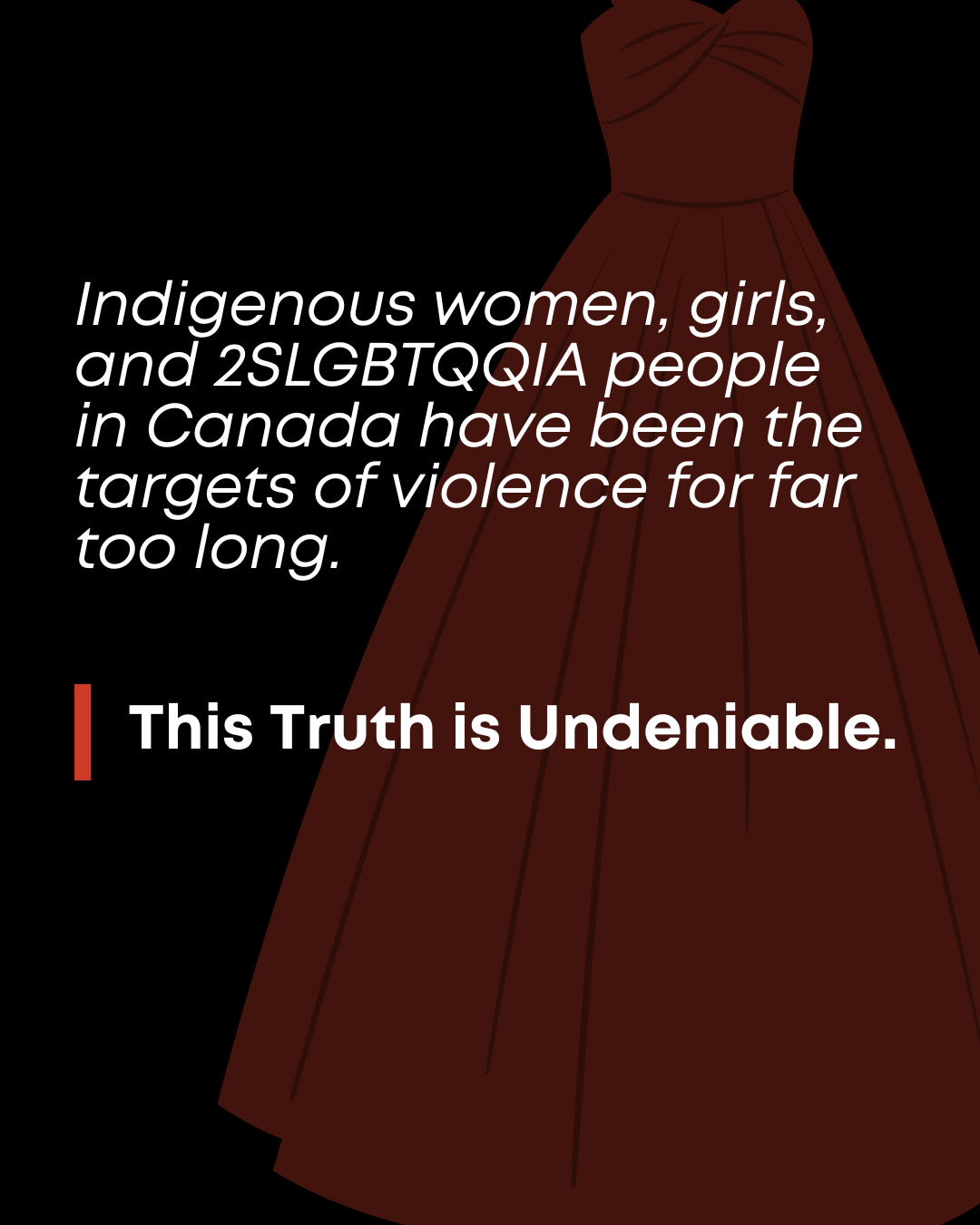Honouring MMIWG2S+ & Standing in Solidarity
Each year on May 5, communities across Canada come together to mark Red Dress Day — a National Day of Awareness for Missing and Murdered Indigenous Women, Girls, and Two-Spirit People (MMIWG2S+). This day is a powerful act of remembrance, justice, and collective action.
The red dress has become a symbol of the stolen sisters and the loved ones still waiting for answers. Empty yet full of presence, each dress speaks to lives taken too soon and the ongoing crisis of gender-based violence facing Indigenous women, girls, and 2SLGBTQ+ people.

What Red Dress Day Means
The red dress has become a powerful symbol for honouring missing and murdered Indigenous women, girls, and Two-Spirit people. This movement began in 2010 with The REDress Project, created by Métis artist Jaime Black. In the original exhibit, more than one hundred red dresses were hung throughout the University of Winnipeg campus — each one representing a life taken and a story left unheard.
Since then, red dresses have appeared across Canada as a striking visual reminder of the ongoing violence faced by Indigenous women and girls. They stand as both a memorial and a call to action — urging us to confront injustice, demand safety, and work toward real change.
Communities continue to demand justice, safety, and accountability. The day is rooted in the hard truths brought forward by the National Inquiry into Missing and Murdered Indigenous Women and Girls.

Our Commitment at First Light
At First Light, we honour Red Dress Day through gatherings that centre remembrance, ceremony, and community care.
We commit to amplifying voices, holding space for grief, and working toward a future where all Indigenous women, girls, and 2SLGBTQ+ people are safe, valued, and protected.
Women are Sacred
Across many Indigenous Nations, women are recognized as sacred and central to the wellbeing of their communities. They are life-givers, water carriers, knowledge keepers, protectors of the land, and stewards of culture and traditions.
Colonial systems attempted to disrupt and erase these sacred roles through forced assimilation, patriarchy, and systemic violence. Honouring and uplifting Indigenous women is essential to restoring balance — to healing our communities, revitalizing languages, protecting the land and waters, and rebuilding traditional governance and cultural strength.
How You Can Take Part
- Wear red on May 5, reflect, and share why the day matters to you
- Join a community event hosted by First Light
- Educate yourself and others using the Calls for Justice
- Create or hang a red dress respectfully in your window, yard, or workplace
- Support Indigenous-led organizations working on the frontlines of this issue

The National Inquiry: Report Findings
In 2019, the National Inquiry into Missing and Murdered Indigenous Women and Girls outlined 231 Calls for Justice. These are not just recommendations — they are legal and moral obligations aimed at addressing the deep-rooted causes of violence against First Nations, Inuit, and Métis women, girls, Two-Spirit, and gender-diverse people.
These Calls for Justice demand real action — from governments, institutions, and every person in Canada — to build a future where Indigenous women, girls, and 2SLGBTQ+ people are safe and supported.
Right to Culture
The history of colonization has altered Inuit, First Nations, and Métis Peoples’ relationships to their culture and identity through targeted policies designed to sever their cultural and kin connections. These attacks on culture, which include residential schools, the Sixties Scoop and other assimilatory policies, are the starting points for other forms of violence Indigenous women, girls, and 2SLGBTQQIA people experience today.
Right to Health
Colonial violence directed toward cultural practice, family, and community creates conditions that increase the likelihood of other forms of violence, including interpersonal violence, through its distinct impacts on the physical, mental, emotional, and spiritual health of Inuit, First Nations, and Métis Peoples. In sharing stories about the health issues they or their missing or murdered loved ones faced and the experiences they had in seeking health services, family members and survivors illustrated how addressing violence against Indigenous women, girls, and 2SLGBTQQIA people must also address their right to health.
Right to Security
As families, survivors, and others shared their truths with the National Inquiry, it became clear that, for the majority of Indigenous women, girls, and 2SLGBTQQIA people living in all settings and regions, security is a key area where violence against Indigenous women and girls can and should be addressed.
Right to Justice
While there are many facets to understanding the experiences of Métis, First Nations, and Inuit women, girls, and 2SLGBTQQIA people and the justice system, a portion of the National Inquiry focuses most closely on the experiences of both the survivors of violence and the families of missing and murdered loved ones. Survivors shared about their experiences with police, the court system, and the correctional system. These encounters highlight crucial disconnections between Indigenous people and justice systems that compromise their basic right to justice.
Support
If you, or someone you know is experiencing signs of distress, don’t hesitate to reach out to services available 24/7/365:
- Hope for Wellness Help Line (Indigenous centred): 1-855-242-3310
- Crisis Services Canada: (Canada-wide) 9-8-8
- National Family and Survivors Circle: 1-844-413-6649
Read more in our News Release.
